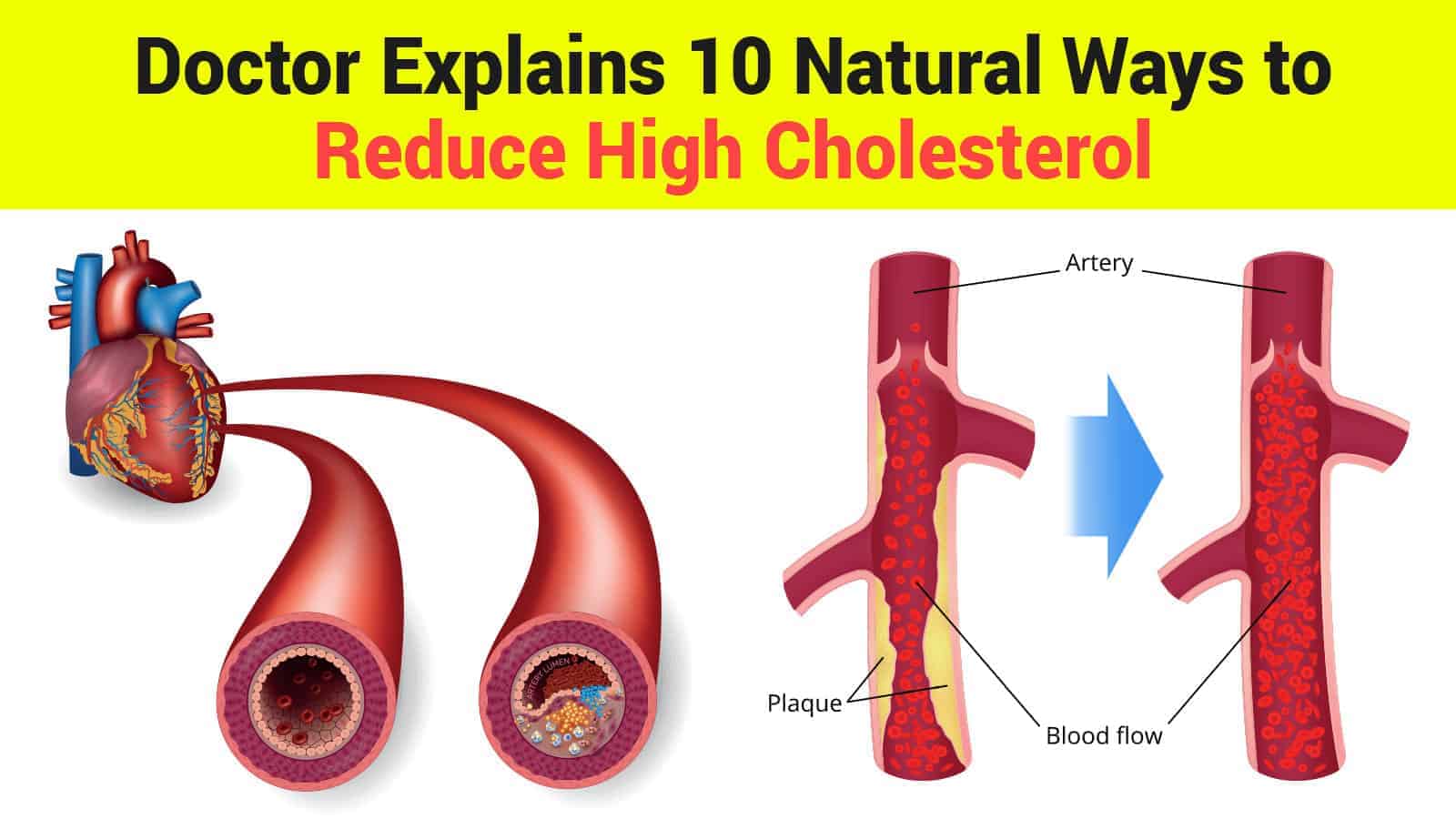Contrary to popular belief, the body needs a certain amount of cholesterol to function optimally. It is only when the body produces an excessive amount of cholesterol that you compromise your wellness. Only then, do doctors deem it as high cholesterol. It is also important to note that the amount in our body is comprised of two types of lipoproteins, low-density lipoprotein (LDL) and high-density lipoprotein (HDL), which both perform very different roles in the body.
Your Body’s Need for “Good” Cholesterol
To further put this into context, low-density lipoprotein is susceptible to free radical damage and can cause heart disease. High-density lipoprotein, on the other hand, protects against heart disease by helping to remove cholesterol from blood vessel walls and transporting it back to the liver.
High-density lipoprotein also prevents clogged arteries, strokes, heart attacks, and end-stage renal disease (kidney failure). If your amount is high, this generally means that your body is producing an excessive amount of low-density lipoprotein and not enough high-density lipoprotein. Although prescription medication like statins can help lower cholesterol that is too high, there are several ways to go about lowering it naturally.
KEY DIFFERENCES BETWEEN HDL AND LDL
To better understand how low-density lipoproteins (LDL) and high-density lipoproteins (HDL) work in the body, we should first take a look at the role of the liver. One of the primary functions of the liver is to produce cholesterol, a process that requires combining cholesterol and fat in very-low-density lipoproteins (VLDL) and transporting it to various organs and cells. During this time, the liver also releases HDL (high-density lipoprotein) to help carry unused cholesterol back to the liver. Also known as reverse cholesterol transport, this process helps prevent clogged arteries and other forms of heart disease. In short, LDL helps the body function properly while HDL, on the other hand, works to combat the ill-effects of excessive amounts of LDL.
WHAT CONSTITUES HIGH CHOLESTEROL?
When it comes to measuring your levels, a combined HDL and LDL reading of 200 milligrams per deciliter (mg/dL) is considered a healthy range for most adults. Conversely, a combined reading that falls between 200 and 239 mg/dL is borderline high. A combined reading of 240 mg/dL or above is considered very high and should be brought under control as soon as possible. In all cases, however, LDL cholesterol levels should be under 100 mg/dL.
COMMON RISK FACTORS FOR ELEVATED CHOLESTEROL LEVELS
Although a poor diet can lead to a dangerous elevation, it is not the only contributing factor. Additional risk factors include
- Consuming a diet high in saturated fat
- Having a body mass index (BMI) of 30 or higher
- Having a large waist size
- Leading a sedentary lifestyle
- Consuming excessive amounts of alcohol
- Smoking
- If you have diabetes
- If you have a family history of heart disease
SYMPTOMS OF ELEVATED CHOLESTEROL
When it comes to symptoms of elevated cholesterol in the blood, there are very few if any. However, excessive cholesterol levels can ultimately give way to heart disease, which can trigger a variety of symptoms, including
- Lightheadedness
- Fatigue
- Heart palpitations
- Shortness of breath
- Chest pain
10 WAYS TO REDUCE HIGH CHOLESTEROL NATURALLY
Now that we have a basic understanding of what causes elevated cholesterol levels, let’s take a look at a few ways of lowering high cholesterol naturally:
1. MONOUNSATURATED FATS
One of the best ways to get higher levels under control is by consuming foods rich in monounsaturated fats. These particular fats are found in olive oil, canola oil, avocados, nuts, and other foods. They work to harmful low-density lipoprotein (LDL) while helping to protect healthful high-density lipoprotein (HDL).
2. POLYUNSATURATED FATS
Consuming foods that are rich in polyunsaturated fats, especially omega-3s, is yet another great way to bring down high cholesterol. Some of the foods that contain these healthy fats include salmon, mackerel, herring, sardines, and shrimp. In a study published by the National Institute of Health, study participants who replaced 5 percent of their calories from carbohydrates with polyunsaturated fats saw their blood glucose levels decrease significantly, which, indirectly, led to a reduction in their cholesterol as well.
3. TRANS FATS
Unlike monounsaturated fats and polyunsaturated fats, those with elevated cholesterol levels would do best do avoid trans fats. For those who are unfamiliar with trans fats, they are unsaturated fats commonly found in spreads, pastries, and cookies and are metabolized by the body differently than other types of fats. Trans fats are especially harmful in that they increase LDL (the harmful kind) and reduce HDL, the good kind your body needs.
4. SOLUBLE FIBER
A diet that includes oat bran, rice bran, barley, citrus fruits, apples, strawberries, and other forms of soluble fiber is ideal for those needing to reduce their cholesterol levels. While it cannot be digested, soluble fiber does a great job when it comes to helping live bacteria in our intestines reduce low-density lipoprotein (LDL). In a study published by the National Institute of Health, study participants who added 3 grams of soluble fiber to their normal diet for 12 weeks saw an 18 percent decrease in their LDL.
5. PLANT STEROLS AND STANOLS
Plant sterols and stanols, which can be found in vegetable oils, butter substitutes, and certain yogurts, have proven to be effective when it comes to reducing elevated cholesterol. In fact, current data shows that consuming foods rich in plant sterols and stanols can reduce harmful LDL by as much as 20 percent.
6. SUPPLEMENTS
When it comes to heart health and reducing cholesterol, supplements like coenzyme Q10 and soluble fiber are worth considering. Studies show that these two supplements not only promote heart health but also do a great job when it comes to lowering elevated cholesterol. Another beneficial supplement is fish oil, which has proven to be effective in reducing fat that would otherwise be carried in the bloodstream. Fish oil can also help increase healthy HDL levels as well.
7. QUIT SMOKING
If you’re a smoker and have elevated cholesterol, you now have yet another reason to quit smoking. Studies show that smoking increases cholesterol by preventing reverse cholesterol transport, the process whereby immune cells move unused cholesterol from blood vessel walls to the bloodstream and ultimately back to the liver. Beyond that, smoking can clog arteries, which, in turn, can increase the risk of heart attacks and strokes.
8. EXERCISING
A sedentary lifestyle not only contributes to weight gain but also elevates cholesterol levels. One of the best ways to get cholesterol under control is by making exercise part of your daily routine. Studies show that just 30 minutes of exercise 5 days a week is enough to reduce high levels and the risk of heart disease.
9. LOSING WEIGHT
Maintaining a healthy weight can go a long way toward keeping your levels in check. Studies show that weight influences how the body absorbs and produces cholesterol. If you’re overweight and trying to reduce your cholesterol, you will be happy to know that weight loss on any diet can increase cholesterol absorption and also limit how much new cholesterol the body is capable of producing.
10. ALCOHOL
When consumed in moderation, alcohol can boost HDL levels and reduce the risk of heart disease. Excessive alcohol consumption, however, can cause liver damage and can also reduce healthy HDL levels in the body.
WHEN SHOULD YOU VISIT A PHYSICIAN?
If lifestyle changes like diet and exercise do not lower your cholesterol levels, it would be in your best interest to see your physician or cardiologist. They can prescribe cholesterol-lowering medications like statins, for example, to get your cholesterol under control. The same applies to those who are genetically predisposed to elevated cholesterol. Doctors generally prescribe medication to those with very high cholesterol or those who have previously experienced a heart attack. These medications work by hindering the body’s ability to produce new cholesterol while absorbing cholesterol that has already formed plaques on artery walls.
FINAL THOUGHTS
In summary, if your cholesterol levels are too high, it can lead to devastating health consequences. The best way to keep your levels within a healthy range is by making changes to your diet. And don’t forget to schedule routine screenings with either your physician or cardiologist. Lastly, if you take cholesterol-lowering medication like statins to help get your cholesterol under control, always take them as prescribed.














 Community
Community

